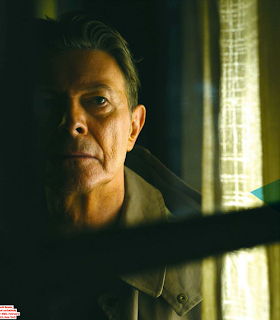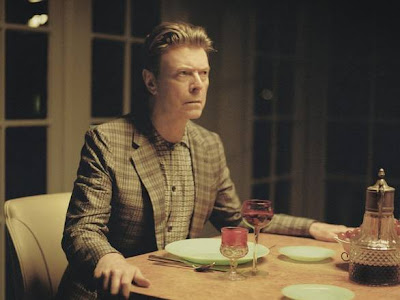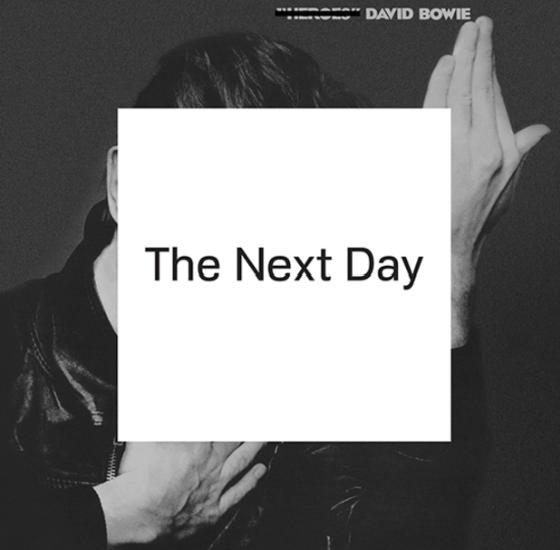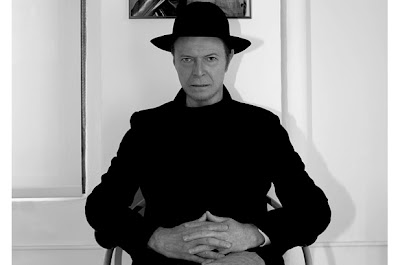It’s not often that I get to welcome back an artist who is often regarded as the greatest who has ever lived. Up until a few months back, no one could have believed that we’d actually be listening to this now. But here it is, the new David Bowie album ‘The Next Day’.
2003’s ‘Reality’ was the third in a series of LPs made since 1999 that saw Bowie abandon his experiments in the 90s for a more straightforward, perhaps less adventurous, approach. Maybe the heart attack he suffered in 2004 was a warning sign, a suggestion that he needed to slow down and have a well deserved break. But a couple of years later and there was still no sign of Bowie returning. The long silence and complete lack of public appearances led to rumours about his health, and as each year of inactivity passed, the chances of Bowie making a comeback were looking less and less likely. Many thought that he had decided he’d made his contribution to the world and owed it to himself to live out a normal life for the rest of his days. Even biographer Paul Trynka thought that he had retired, and wouldn’t ever return unless he could deliver something “seismic”.
Then a few weeks ago, on the day that Bowie turned 66 years old, the world was stunned at the instant arrival of a new single and the announcement of a brand new album. How did one of the world’s biggest stars manage to record an LP in complete secrecy over two years, without rumours getting out and news being leaked on the internet? In an age of instant and easily accessible information, this true icon had pulled off a masterstroke. The musicians involved in the record were all made to sign non-disclosure agreements, and even producer Tony Visconti had to keep his mouth shut whenever asked about Bowie’s activities. This comeback album was secretly recorded, sensationally announced, and has been heralded by a storm of hype whipped up by the music press, clamouring to welcome back this unquestionable legend. But is it really the “seismic” work that Bowie needed to come out of retirement to give to the world?
The opening title track’s dark strut is put to the grisly tale of a tyrant being overthrown, a subject clearly inspired by Bowie’s new-found interest in medieval history. With its inspired lyrical imagery and angular guitars, this is not the sound of a frail old man with nothing left to say. In fact, the 66 year old Bowie has more to say than the vast majority of artists many years younger. Immediately it feels a lot more vital from the beginning, like Bowie’s decided that he only wants to be heard when he has something truly outstanding to offer. And this is it. Not only the album Bowie fans have been awaiting for a decade, but the return to form that a lot of people thought would never happen.
 ‘Dirty Boys’ is a portrayal of a feral gang of delinquent hooligans set to sleazy guitars, seedy horns and omitting a creeping burlesque vibe, while ‘The Stars (Are Out Tonight)’ is a lot more clever than it would first appear. Maybe it’s about the superficial nature of modern day stardom compared to his true eternal fame, or perhaps it’s just about two lovers looking up into the night sky. Or it could even deal with the shallow culture we have to tolerate, where people are more likely to gaze at celebrities in magazines rather than gaze at the constellations. But one thing’s for sure, Bowie is fully aware of his mortality as well as his immortality: “the stars are never sleeping, the dead ones and the living”.
‘Dirty Boys’ is a portrayal of a feral gang of delinquent hooligans set to sleazy guitars, seedy horns and omitting a creeping burlesque vibe, while ‘The Stars (Are Out Tonight)’ is a lot more clever than it would first appear. Maybe it’s about the superficial nature of modern day stardom compared to his true eternal fame, or perhaps it’s just about two lovers looking up into the night sky. Or it could even deal with the shallow culture we have to tolerate, where people are more likely to gaze at celebrities in magazines rather than gaze at the constellations. But one thing’s for sure, Bowie is fully aware of his mortality as well as his immortality: “the stars are never sleeping, the dead ones and the living”.
The intense gothic rock crunch of ‘Love Is Lost‘ is a world away from the elegiac reflection of ‘Where Are We Now?‘, the album’s most sombre and graceful moment. But while it looks back on the past, mourning its passing with a teary eye, it also celebrates life as the sadness takes a joyful turn during the song’s stunning climax. ‘Valentine’s Day’ is the closest he (and anyone else) has ever come to reviving the magic of ‘Ziggy Stardust’, putting an instantly engaging melody to a description of a certain embittered individual wanting revenge on the world, possibly a high school killer. The frantic bustle of ‘You Can See Me’ provides another striking contrast, reprising the utter chaos of 1995’s ‘Outside’ and the drum n bass rhythms used on follow-up ‘Earthling’. There’s a tune in there somewhere, but melody is clearly not its main concern.
It’s more adventurous than his three previous albums (…Hours, Heathen, Reality), but the ideas sound more fully formed and carefully thought out this time round. In fact, this could very well be his most diverse collection of songs. Sometimes you have to look below the surface to understand the genius of this record, and trying to get your head around the lyrics is like venturing into a mental minefield. ‘I’d Rather Be High‘ brings forward passionately delivered vocals, anti-war commentary, complex lyrical references and a spacey guitar hook that lends the track a gliding psychedelic ambience, while ‘Boss Of Me’ is characterised by rasping horns and bright drums. The instrumentation gives it a typically New York sound, appropriate since all these songs were written and recorded there. Maybe, as an Englishman, realising the contrast of his original surroundings enables him to soak up the sound of the city and embody it into his music more effectively than anyone else. ‘Dancing Out In Space’ seems to constantly have stuff going on; in fact, it’s not unlike something from the ‘Let’s Dance’ era mixed with the warped oddness of ‘Low’. This and the preceding ‘Boss Of Me’ are both enjoyable, but probably the two least substantial moments on ‘The Next Day’.

The lyrics are cryptic and fascinating, often inviting the listener’s own interpretation. But it’s not just his words that make you wonder, it’s the various musical references to his past and what they could mean in the context of these new songs. It’s the sound of an artist aware of the influence he has had over the years, and ‘The Next Day’ brilliantly represents the way that his past haunts the present.
‘How Does The Grass Grow’ begins like another 80s Bowie number but that enjoyably weird chorus is something else altogether. It certainly takes some unexpected turns that’s for sure, including a vocalisation of ‘Apache’ by The Shadows. The muscular power of ‘You Will Set The World On Fire’ thrives with Kinks-esque guitars and a hugely infectious chorus, making for an obvious potential single. And that squealing ‘Scary Monsters’-like solo is absolutely magnificent. With its showstopping melodrama, the glorious ‘You Feel So Lonely You Could Die’ is like an introspective companion piece to ‘Rock N Roll Suicide’, magically rising into a sky-reaching gospel chorus. It fades out with the drum pattern that opens ‘Five Years’. Again it makes the listener wonder how it fits into the jigsaw of the song, intriguing and sprinkled with mystery.
‘Heat’ is a sparse, ominously brooding closer. that wouldn’t have sounded out of place on the Berlin trilogy, a sinister drone of claustrophobia and coldness punctuated by an unsettling croon. As it fades, the strummed acoustic guitar begins to resemble the intro to ‘Space Oddity’, bringing his latest album to a close by returning full circle to his very first hit single. What could it possibly mean?
Perhaps being out of action for so long and watching the world of popular “entertainment” descend into vacuous blandness might have awoken something in him that had been sleeping for a long time. Perhaps before 2004 he was too concerned with constantly moving forward and making the next record to possibly take a break. Too busy to take a look back at his entire life, career, and his musical journey through the decades. After taking the time out and making sense of his past, he’s also aware that the weight of his history is always going to be on people’s minds whenever he releases new music. But this album’s revisiting of his past is not about nostalgia, it’s about placing references to previous works in the fresh context of new songs.
It somehow bridges many styles that are completely at odds with each other, adding a new ingredient to gel them together. That new ingredient is the present day. Despite revisiting many eras of his past, he doesn’t ever fall into the trap of self-parody and certainly doesn’t sound like he’s running out of new ideas. He’s challenging himself again, not wishing to end his career with the comfort and steadiness of the previous three LPs. No one else could have made a record like this but Bowie, in fact it’s only now that he himself is capable of doing so. Just like no-one could have made an album like ‘Station To Station’ except for the 1976 Bowie. His output is so wide ranging and diverse that none of his albums come close to defining him, because each era saw a different Bowie. But this is a case of looking back while moving forwards.
He doesn’t ever sound like a “museum piece” over the course of these 14 tracks, in fact he sounds more hungry and more relevant than he has done for decades.
To say it’s a pleasure to have him back would be an understatement.
Rating: 









